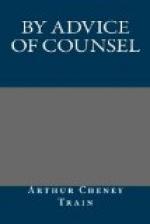“But the judge said it wasn’t privileged!” retorted the other.
“Mr. Tutt said it was, though,” shot back the salesman.
“Well, the judge said—”
“Let’s go in and find out who said what,” proposed the tall man. “I’d like to know myself. I don’t remember who said anything any longer.”
So they filed back into court.
“Your Honor,” stuttered the foreman, licking his lips in embarrassment, “some of the gen’l’muns vant to inguire veder the gonversation between Mr. Brown and Mr. Lowry is privileged or veder we haf to belief it?”
The judge, who had evidently expected that the return of the jury was for the purpose of declaring the defendant guilty, scowled.
“The rule is,” said he wearily, “that conversations between a doctor and his patient are privileged and cannot be testified to without the consent of the patient. If Brown had been a doctor—which he is not—it is possible that I might have sustained Mr. Tutt’s objection on the ground and struck out the conversation. But he only pretended to be a doctor, and no privilege exists under those circumstances even if in some cases it seems to work a hardship upon the one who is deceived. The conversation in this instance is part of the record. You may retire.”
But Bently, with a light upon his countenance such as theretofore had ne’er been seen on sea or land, suddenly held up his hand.
“One question, Your Honor. If Brown had been a doctor you would have excluded the testimony?”
The aged angel raised his eyebrows deprecatingly.
“Perhaps; I might have considered the suggestion.”
“Thank you,” said Bently, and they all traipsed out.
“That cooks him!” whispered Phelan to Mr. Tutt at the keyhole.
“Wait and see! Wait and see!” muttered the lawyer. “We’re not dead yet.”
Once back in their room the jury took another vote. Eleven to one again. Then Bently rose.
“Gentlemen,” he cried, “I think I have the key to this case.”
They all gazed at him expectantly.
“We are obliged by law to give every reasonable doubt to the defendant. Now the only obstacle to our acquitting this poor old man is the fact that there is in evidence a conversation in which Lowry is claimed to have said that he was a veterinary and had been acting as such all his life. Mr. Tutt says that that conversation is privileged and should be disregarded because it was a confidential communication between a doctor and a patient. The judge says it is not privileged for the reason that Mr. Brown was not in fact a doctor—but he says further that if Brown were a doctor we should have to disregard that part of the evidence—which would, as we all agree, leave us free to acquit.
“Now then, how do we know Brown is not a doctor? He says he isn’t; but he lied about everything else he told Lowry, and he may have been lying about that too. And if he lied to Lowry he may have been lying to us here to-day. I say that there is a reasonable doubt right there as to whether Brown is really a doctor or not. Such a doubt belongs to the defendant. He is entitled to it and it is our duty to acquit him!”




